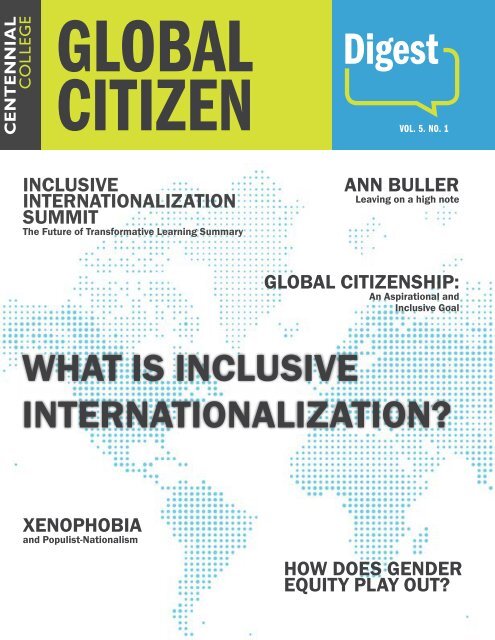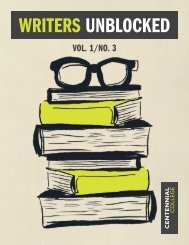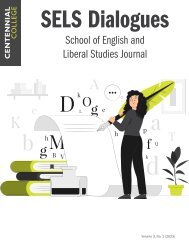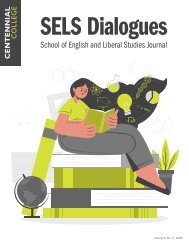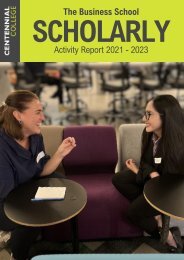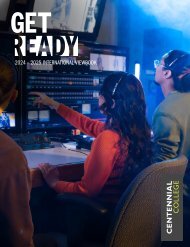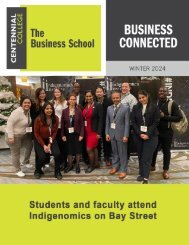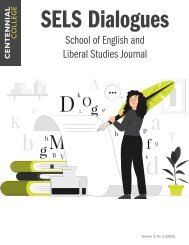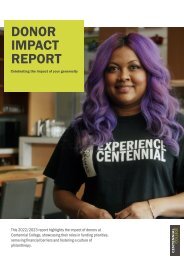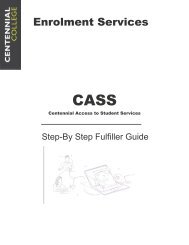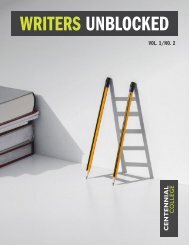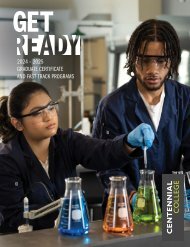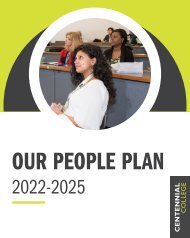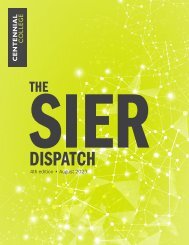Global Citizen Digest Magazine Volume 5, Issue 1
Create successful ePaper yourself
Turn your PDF publications into a flip-book with our unique Google optimized e-Paper software.
GLOBAL<br />
CITIZEN<br />
<strong>Digest</strong><br />
VOL. 5. NO. 1<br />
INCLUSIVE<br />
INTERNATIONALIZATION<br />
SUMMIT<br />
The Future of Transformative Learning Summary<br />
ANN BULLER<br />
Leaving on a high note<br />
GLOBAL CITIZENSHIP:<br />
An Aspirational and<br />
Inclusive Goal<br />
WHAT IS INCLUSIVE<br />
INTERNATIONALIZATION?<br />
XENOPHOBIA<br />
and Populist-Nationalism<br />
HOW DOES GENDER<br />
EQUITY PLAY OUT?
4<br />
Ann Buller<br />
is Leaving the Building<br />
What's Inside?<br />
11<br />
Xenophobia and Populist-Nationalism: Insights<br />
from Future Post-Secondary Students<br />
16<br />
Strengthening International<br />
Student Experience with VOICE<br />
8<br />
<strong>Global</strong> <strong>Citizen</strong>ship:<br />
An Aspirational and<br />
Inclusive Goal<br />
15<br />
Call for your<br />
Submissions<br />
19<br />
What’s Fair is Fair:<br />
What Happened at Centennial<br />
College’s First Social Justice Fair?<br />
Check out<br />
the Inclusive<br />
Internationalization<br />
Summit Summary<br />
Report here<br />
GLOBAL<br />
CITIZEN <strong>Digest</strong><br />
Vol. 5. No. 1<br />
Published by:<br />
Centre for <strong>Global</strong> <strong>Citizen</strong>ship Education and Inclusion<br />
P.O. Box 631, Station A, Toronto, ON M1K 5E9<br />
Managing Editors<br />
Graphic Designer<br />
Reviewers<br />
Article Citation<br />
Punita Lumb<br />
Yasmin Razack<br />
Marie Joseph<br />
Gabriel Bedard<br />
Tatiana Wugalter<br />
Ankar Anwar<br />
Resham Karfa<br />
<strong>Global</strong> <strong>Citizen</strong> <strong>Digest</strong><br />
Centennial College:<br />
Toronto<br />
<strong>Volume</strong> 5, <strong>Issue</strong> 1<br />
21 24<br />
How Does Gender Equity Play<br />
Out? Panel Pushes Audiences to<br />
Reimagine Sport Spaces<br />
<strong>Global</strong> Perspectives<br />
25 26 28<br />
31<br />
#WhatsOnYourShelfie <strong>Global</strong> <strong>Citizen</strong>ship<br />
in Action<br />
Dear <strong>Global</strong> <strong>Citizen</strong> References<br />
2 <strong>Global</strong> <strong>Citizen</strong> <strong>Digest</strong><br />
<strong>Global</strong> <strong>Citizen</strong> <strong>Digest</strong> 3
Longest-serving Centennial College<br />
President recounts her 30-year<br />
relationship<br />
Ann Buller and Centennial College arrived around<br />
the same time, perhaps the consequence of some<br />
celestial alignment. She emigrated from Scotland as<br />
a young girl not long after Centennial had opened its<br />
doors in a hastily-renovated radar factory in Toronto's<br />
east end in 1966.<br />
“It seems destined that my life and this college’s<br />
would become so deeply intertwined – we both<br />
learned to walk at the same time,” she wrote in her<br />
introduction to Fifty Years Bolder, the book published<br />
for Centennial’s 50th anniversary.<br />
Ann was the first in her working-class family to attend<br />
post-secondary education, but it would be college, not<br />
university, that would fulfill the role. Ann had sought<br />
an affordable education that prepared her for the<br />
world of work, but she chose a path that would give<br />
her so much more.<br />
After graduating from Humber College with a public<br />
relations diploma, she worked in student government<br />
for a short while before applying to join Centennial as<br />
a recruitment officer. She won the job and reported<br />
for duty at Warden Woods Campus, the former factory<br />
site that looked a lot different from Progress Campus,<br />
where she had been interviewed.<br />
4 <strong>Global</strong> <strong>Citizen</strong> <strong>Digest</strong><br />
ANN BULLER<br />
Leaving on a<br />
high note<br />
“I always felt that Warden Woods had a family feel<br />
to it. I hung out in the basement at home with my<br />
friends when I was growing up, so the campus had<br />
that informal vibe,” says Ann, smiling. The year<br />
was 1989, and Centennial had just established its<br />
marketing department.<br />
“The President called us together and said we’re down<br />
13 per cent in applications. I remember the energy<br />
around that, the creativity, and getting the resources<br />
to be able to do some interesting things. It was an<br />
amazing rollercoaster ride of working bizarrely long<br />
hours, but doing good things and having fun.”<br />
Despite having been around for more than 20 years,<br />
Ontario's Colleges of Applied Arts and Technology were<br />
not always top of mind for students and their parents<br />
and teachers. Just arranging visits to talk to high<br />
school students was sometimes challenging.<br />
I remember calling to book<br />
appointments and having high<br />
schools tell me, no, we don't<br />
want to send our students to<br />
college. It shocked me; I didn’t<br />
expect to get that response.<br />
Fortunately, Ann had a knack for giving high-energy<br />
presentations, and it wasn’t long before she was an indemand<br />
speaker. After all, she believed in the product,<br />
having completed college herself.<br />
"I always felt that if I could get that group riled up<br />
about college, then I had succeeded.” And after<br />
Centennial started tracking where its students came<br />
from, she discovered that “our students don’t go to<br />
college” was a misconception.<br />
President Ann Buller official portrait, 2004<br />
I remember calling some of<br />
the high school guidance<br />
counsellors back and saying<br />
29 of your students are here<br />
at Centennial. So you’re not<br />
helping them get here, but<br />
they are getting here. We had<br />
tremendous results from that.<br />
Ann and her team were the first to visit summer<br />
schools to talk to students who had failed a credit<br />
and were writing themselves off. She told them that<br />
they could attend college in the fall if they wished to, a<br />
novel recruitment approach that boosted enrolment.<br />
Promoted to Manager of Liaison and Community<br />
Relations, Ann developed strategies to meet<br />
enrolment targets, including personalized direct mail,<br />
focused customer service training and closer ties with<br />
high-school teachers and guidance counsellors.<br />
As Director of Student Services, Ann broke new<br />
ground by instituting student retention strategies,<br />
including student success surveys, work that earned<br />
the college a coveted Noel-Levitz Retention Excellence<br />
Award. She was named Centennial’s Vice President<br />
of Student Services and Advocacy in 1999. A year<br />
later she got a phone call that would change her<br />
career trajectory.<br />
“A search firm called and asked me if I was interested<br />
in a Vice President position at Nova Scotia Community<br />
College. I said absolutely not. But they kept calling,<br />
saying my name kept coming up.”<br />
Ann eventually relented and flew to Halifax to see what<br />
NSCC, with 13 campuses across Nova Scotia, was all<br />
about. What was supposed to have been an informal<br />
chat became a full-fledged job interview, and Ann grew<br />
excited about the tasks they had laid out, including<br />
implementing a strategic review and career education<br />
policy for the entire province.<br />
“The President had told me that it was not a matter<br />
of having NSCC catch up with everyone else, but to<br />
leapfrog ahead with some bold ideas,” Ann recalls.<br />
She relished the challenge and took the job. “It was<br />
an unbelievable rollercoaster ride, and the pace of<br />
change was huge.”<br />
Within months of her starting, two airliners crashed<br />
into New York’s World Trade Centre on 9/11 and<br />
the repercussions were felt in Nova Scotia, where<br />
thousands of air travellers were redirected after the<br />
U.S. closed its airspace.<br />
“We sheltered 1,500 airline passengers by opening<br />
Akerley Campus to them” Anne says. Much like the<br />
scenes from Come From Away, the hit musical about<br />
the travellers who landed in Gander, Newfoundland,<br />
the personal stories of the stranded passengers<br />
were extraordinary, as was the response by the local<br />
community. Ann and her volunteers worked around<br />
the clock to look after their accidental visitors for an<br />
unforgettable week of heartache and friendships.<br />
In 2003, Centennial College President Richard<br />
Johnston announced he would not be renewing his<br />
contract for a second term, and the search was on<br />
for a new leader. Word got back to Ann in Nova<br />
Scotia. Centennial was not in great financial shape,<br />
and enrolment growth had waned. Ann knew that<br />
if she wanted the job, she would have to bring a<br />
daring proposal.<br />
We needed to catalyze change at<br />
the college, something profound<br />
to make it a standout in the<br />
marketplace. I came up with the<br />
‘signature academic experience’<br />
at my kitchen table.
Ann travelled to Toronto in late 2003 to make her<br />
pitch. Knowing Centennial’s strength is its diversity,<br />
Ann intended to amplify it by building students’<br />
understanding of social equity and justice issues,<br />
and by giving them portfolio learning and cultural<br />
competencies to prepare them to work in an<br />
increasingly global economy.<br />
Ann’s audacious vision won her the job. The renamed<br />
Signature Learning Experience (SLE), the product of<br />
extensive consultation with more than 1,000 faculty<br />
and staff members, became a bold statement of<br />
distinction that would set Centennial apart.<br />
Ann began her new role at Centennial in June 2004,<br />
and was formally installed in a ceremony at the<br />
gleaming new Science and Technology Centre at<br />
Morningside Campus. Among her first duties was to<br />
unveil a new summer program that involved delivering<br />
tuition-free courses to “at-risk” youth living in the<br />
Malvern neighbourhood in northeast Scarborough.<br />
Toronto Mayor David Miller attended the project<br />
launch and later told the Globe and Mail that<br />
Centennial’s community outreach effort was the<br />
highlight of his first year in office. The summer college<br />
experience would eventually become HYPE (Helping<br />
Youth Pursue Education), which continues to produce<br />
positive results to this day.<br />
As the SLE took shape – requiring every full-time<br />
student to take the innovative GNED 500 <strong>Global</strong><br />
<strong>Citizen</strong>ship course – Ann mused about offering<br />
opportunities for students to travel overseas.<br />
HYPE Baking class graduation, 2013<br />
Ann with Mayor David Miller, 2004<br />
We know from studies<br />
that just eight days in<br />
another environment can<br />
fundamentally change<br />
you – and that’s what we<br />
set out to do. We want<br />
our students to go abroad<br />
and see the world, to<br />
democratize education so<br />
that everyone, regardless<br />
of their means, can have a<br />
chance to get out there.<br />
The first group of students and faculty/staff advisors<br />
travelled to work in rural Dominican Republic. The<br />
college paid for the flights and accommodations, and<br />
many of the meals were provided by the local agency<br />
that was orchestrating the service work.<br />
“We try to partner with established non-profits<br />
on the ground who may have experience hosting<br />
students. That way we’re assured of a safe place<br />
in which our learners can perform their work,” says<br />
Ann. Increasingly bold adventures have dispatched<br />
students to destinations such as the Amazon River<br />
basin and the Great Rift Valley in Kenya.<br />
“What’s incredible is that our international students<br />
have really taken advantage of these trips. And the<br />
Aboriginal components have grown; we want more<br />
opportunities for students to learn about Indigenous<br />
cultures right here in Canada.”<br />
Ann with Jean Augustine,<br />
Ontario Fairness Comissioner<br />
Participating students develop leadership skills and<br />
work to create positive social change in rural places<br />
that barely register on any map. And, as promised,<br />
students come back profoundly changed.<br />
Ann has long recognized Centennial serves a<br />
community of learners with financial needs. In<br />
response, she created the Lesley Russell<br />
Scholarship, the Ann Buller Indigenous Entrance<br />
Scholarship and the David and Isabel Buller<br />
Scholarship. She also supports the college’s annual<br />
golf tournament fundraiser.<br />
In addition to her college diploma, Ann found the<br />
time between her administrative duties to complete<br />
a Bachelor of Arts in Sociology from York University,<br />
and a Master of Arts in Education from Central<br />
Michigan University.<br />
To list all of Ann’s accomplishments, awards and<br />
accolades since her return to Centennial in 2004<br />
would take up a good number of these magazine<br />
pages. Suffice it to say that her vision to transform<br />
Centennial has been realized. With her guidance,<br />
the college community has authored three Book of<br />
Commitments, comprehensive strategic plans that lay<br />
out the college’s roadmap in five-year increments.<br />
The environmental scans and consultations with<br />
employers, advisory committee members, the Board<br />
of Governors, College Council, the Alumni Association,<br />
students and staff have resulted in plans that<br />
strategically and thoughtfully position Centennial<br />
for success.<br />
“Our strategic plans describe a college with bolder<br />
commitments, reflecting the confidence in, and<br />
passion for, the work of transforming lives and<br />
communities through learning,” notes Ann. Compared<br />
to the complacent school she found in 1989, the<br />
transformation of Centennial itself has been nothing<br />
short of astounding.<br />
Ann with culinary students<br />
at CENTItalia, 2017<br />
This spring Ann Buller will leave Centennial, reluctantly<br />
but by choice, as its longest-serving and most<br />
impactful president. But she pledges to stay connected<br />
to the institution she’s inspired and led for most of<br />
three decades.<br />
I have a deep emotional<br />
connection to this place. But<br />
it’s the right time for a change<br />
in leadership,” she says, as a<br />
tremor of emotion crosses her<br />
face. “It’s going to be hard to<br />
leave the building when that<br />
day arrives.<br />
6 <strong>Global</strong> <strong>Citizen</strong> <strong>Digest</strong><br />
Ann Buller Breakfast Club at Taylor<br />
<strong>Global</strong> <strong>Citizen</strong> <strong>Digest</strong> 7<br />
Creek Public School, 2018
I<br />
recently read an article by Nico Jooste –<br />
highly respected internationalization<br />
professional, past head of the International<br />
Education Association of South Africa and key<br />
idea man behind the groundbreaking Nelson<br />
Mandela Bay <strong>Global</strong> Dialogue on the Future of<br />
Internationalization in Higher Education (Heleta<br />
and Jooste, 2017). In the article, Jooste talks<br />
about the concept of global citizenship being<br />
necessarily western-centric, which inherently<br />
excludes the <strong>Global</strong> South. He and Heleta posit<br />
that the <strong>Global</strong> South does not have access to<br />
the very notion of global citizenship, and suggests<br />
instead focusing on global competence. He<br />
states that:<br />
…global citizenship in higher education<br />
(HE) is not a viable or desirable<br />
proposition for the South.<br />
(Jooste, 2017).<br />
Additionally, Brett Bowden (Bowden, 2003) notes<br />
that “to be in a position to claim to be a global citizen<br />
is a privilege that is reserved for the modern, affluent<br />
global bourgeoisie.”<br />
Inclusive <strong>Global</strong> <strong>Citizen</strong>ship<br />
<strong>Global</strong> <strong>Citizen</strong>ship:<br />
An Aspirational<br />
and Inclusive Goal<br />
While I understand and was challenged by the<br />
critiques of global citizenship as a child of the<br />
<strong>Global</strong> South raised in the <strong>Global</strong> North, I stand<br />
firm in my conviction that global citizenship is<br />
an aspirational goal available and desirable to<br />
all. Here's why:<br />
<strong>Global</strong> citizenship is an inclusive concept.<br />
From the conception of global citizenship, it<br />
has been inclusive. Kwame Anthony Appiah, in<br />
a 2007 keynote address, talked about the first<br />
known individual to claim global citizenship,<br />
the Greek philospher Diogenes (Appiah, 2007).<br />
His idea of being a global citizen, or what he<br />
called being a citizen of the world, had the<br />
following three attributes:<br />
1. We do not need a single world<br />
government.<br />
2. However, we must care for the fate of all<br />
human being inside and outside our own<br />
societies.<br />
3. We have much to gain from conversation<br />
with one another across our differences.<br />
In reviewing the literature for more recent<br />
definitions of global citizenship, it is clear that<br />
it is an expansive concept with no single and<br />
accepted definition. For example, a global<br />
citizen is defined by Ron Israel (2012) as<br />
"someone who identifies with being part of an<br />
emerging world community and whose actions<br />
contribute to building this community’s values<br />
and practices.”<br />
Madeleine Green (2012), drawing from a variety<br />
of sources, lists the following elements of global<br />
citizenship:<br />
• “A choice and way of thinking.” While being<br />
born in a country is out of an individual’s<br />
control, being engaged with the world is not. It<br />
speaks to the choice in thinking, the freedom<br />
of decision, that an individual can become a<br />
global citizen or not.<br />
• “Self-awareness and awareness of others.”<br />
Recognizing that personal and individual<br />
actions (can) affect the collective. “<strong>Global</strong><br />
citizenship entails an awareness of the<br />
interdependence of individuals and systems<br />
and a sense of responsibility that follows<br />
from it.”<br />
• “Participation in the social and political life of<br />
one’s community.” This can range from the<br />
local community to the global community, and<br />
include religious, community, political and other<br />
groups. It speaks to a sense of connection to<br />
other communities (Green, 2012).<br />
According to UNESCO, “<strong>Global</strong> citizenship<br />
(education) aims to empower learners to assume<br />
active roles to face and resolve global challenges<br />
and to become proactive contributors to a more<br />
peaceful, tolerant, inclusive and secure world”<br />
(UNESCO, n.d.).<br />
Common to these definitions are the concepts of<br />
self-identification as a global citizen and active,<br />
mindful engagement in communities, whether<br />
local or global, for positive change. Given these<br />
expansive definitions, it would follow that access<br />
to global citizenship is available to everyone,<br />
and can be deployed differently. Individuals can<br />
choose to be global citizens or not, regardless of<br />
circumstances or location.<br />
<strong>Global</strong> citizenship does not have to<br />
include mobility.<br />
While global citizenship may be "practiced and<br />
promoted by those with the ability, and means<br />
to travel and engage around the globe” (Jooste,<br />
2017) this is neither a foundational nor a required<br />
component of global citizenship.<br />
But mobility is important, even while traditional<br />
mobility is not the only way to move ideas around<br />
the world. Remember Diogenes: We have much<br />
to gain from conversation with one another<br />
across our differences (Appiah, 2007). Mobility of<br />
thought, facilitated by ever-accessible technology,<br />
has become possible like never before, and is<br />
accessible to both individuals in the <strong>Global</strong> North<br />
and, increasingly, the <strong>Global</strong> South.<br />
<strong>Global</strong> citizenship does not need to be measured.<br />
It is an aspirational goal that can be interpreted<br />
differently.<br />
Darla Deardorff et al. (2012) asks, "is it possible<br />
and desirable to reach commonly agreed upon<br />
foundational principles” of global citizenship?<br />
Beyond two basic notions underpinning global<br />
citizenship –self-identification as a citizen of the<br />
world and active community engagement for<br />
positive change – I do not believe it is.<br />
Therefore, global citizenship does not need to live<br />
within the institution. Though global citizenship is<br />
a concept, it is also so much more. It is an end,<br />
an aspirational goal and a philosophy that, when<br />
employed through international experiences,<br />
globalized classrooms, curriculums, community<br />
engagement and/or mindset, can lead to positive<br />
social change.<br />
<strong>Global</strong> citizenship is good, and in our increasingly<br />
interconnected world, fostering global citizenship<br />
is desirable and practical, whether it comes from a<br />
college or university, a community organization, or<br />
an inspired individual.<br />
Whether it is by necessity or by design, individuals<br />
in the <strong>Global</strong> South are highly engaged citizens<br />
of the world. Take, for example, the permaculture<br />
(permanent agriculture or permanent culture)<br />
farmers of Cuba. The economic downturn that<br />
affected much for the world in the early 1990s<br />
had significant repercussions for Cuba’s importdependent<br />
food industry. Farmers were forced<br />
to respond, and they did so with a system of<br />
agriculture that works with nature, following three<br />
foundational principles: Caring for the Earth, caring<br />
for people and returning any surplus to the land and<br />
to the people (Bell, 2992). Through partnerships<br />
with organizations throughout the world, these<br />
farmers share their permaculture expertise.<br />
Recently, a group of Centennial College<br />
students, faculty and staff had the opportunity<br />
to visit permaculture projects and were not only<br />
transformed by the experience, they “gained<br />
8 <strong>Global</strong> <strong>Citizen</strong> <strong>Digest</strong><br />
<strong>Global</strong> <strong>Citizen</strong> <strong>Digest</strong> 9
Inclusive <strong>Global</strong> <strong>Citizen</strong>ship<br />
from (the) conversation with one another…” (Appiah,<br />
2007). They will share their expertise with their school<br />
community, but also beyond. one student, Alysha Morris,<br />
immediately put some of the practices in place, engaging<br />
future citizens of the world – her children:<br />
Xenophobia and populist-nationalism:<br />
Insights from Future<br />
Post-Secondary Students<br />
Alysha Morris, <strong>Global</strong> <strong>Citizen</strong>ship and Equity Learning Experience Participant,<br />
May 2017. Alysha Morris teaches her children how to re-purpose used items<br />
for urban permaculture use.<br />
We took our old BBQs and scrap items that were to<br />
be disposed of, cleaned them up and turned them<br />
into plant beds and a small garden. This was to<br />
remember my amazing experience in Cuba and to<br />
implement what I have learned in my own home and<br />
with my children. We have planted and implemented<br />
one thing from each farm I attended. We did a flower<br />
bed made from re-used items, planted carrots,<br />
squash, green onions, tomatoes and<br />
green peppers.<br />
By Janine Knight-Grofe<br />
Janine Knight-Grofe is Manager, International<br />
Education at Durham College, where she is<br />
responsible for a multifaceted portfolio of<br />
activities and services for international<br />
students, oversees education abroad<br />
and supports the institution in its<br />
internationalization-at-home goals.<br />
Prior to Durham College, Janine managed<br />
global experiences at Centennial College, and<br />
spent 10 years at the Canadian Bureau for<br />
International Education (CBIE) where she was<br />
lead author of Canada’s global report on the<br />
state of international education in Canada and<br />
Team Leader for the International Students and<br />
Immigration Education Program.<br />
Janine holds a Master of Science in Comparative<br />
Politics from the London School of Economics.<br />
It<br />
is mid-year 2017, and in the daily news, we are increasingly confronted by stories<br />
of xenophobia (Zelinksky, 2006), populism (Human Rights Watch, 2017), and<br />
nationalism (Harvard Gazette, 2017). With just a slight scratch of the surface,<br />
these stories seem to reveal multiple examples of a distaste for diversity and<br />
a desire to exclude. At the same time, there is ample evidence that some<br />
organizations and nations are seeing diversity as a strength (Mark, 2017) and inclusion as a<br />
key goal. Deloitte (Australia) routinely produces reports focusing on the value of diversity and<br />
inclusion in the workplace. Closer to home, we have witnessed the relatively recent creation<br />
of the Canadian Centre for Diversity and Inclusion with a mission "to generate the awareness,<br />
dialogue and action for people to recognize diversity as an asset and not an obstacle.” But<br />
what of the world of post-secondary education? In particular, what is the impact of this new<br />
political climate on students who travel internationally in pursuit of their post-secondary<br />
education? It is the intent of this article to begin to explore, in a very personal way, the<br />
first-hand impact of this new climate on international students who plan to begin their postsecondary<br />
learning in this new reality.<br />
In the interests of inclusion, this article was purposefully co-authored by one professor and<br />
three current secondary school students. The purpose of the article is to understand the<br />
personal impact of the rise of xenophobia and populist-nationalism on students. Young<br />
people who are currently in their final years of secondary school actively investigate where<br />
they wish to pursue their post-secondary studies. Insights from these students can shed light<br />
on the individual impact of the changing global political climate. For educators, it is vital to<br />
understand the perspective from students, as these are the individuals who are members of<br />
our classes.<br />
In order to write this paper, the four authors collaborated on co-creating<br />
questions and answers that would help to provide the reader with an insight<br />
into the thinking and experiences of the three student-authors in the context<br />
explained above. The authors agreed that the most effective way to ‘give<br />
voice’ to the student-authors would be to use a question-and-answer format,<br />
as it would provide the most direct connection between<br />
students and readers. The three student-authors are Jingze<br />
Dong, Roman Wang and Yuning Wang. Their answers to the<br />
questions are provided on the following page, preceded by<br />
their first names.<br />
10 <strong>Global</strong> <strong>Citizen</strong> <strong>Digest</strong><br />
<strong>Global</strong> <strong>Citizen</strong> <strong>Digest</strong> 11
Inclusive <strong>Global</strong> <strong>Citizen</strong>ship<br />
Question 1: What general concerns do you have knowing that there<br />
is a climate of rising xenophobia and populist-nationalism?<br />
Question 3: What do you believe rising xenophobia and<br />
populist-nationalism might mean for your post-secondary education?<br />
Jingze: My general concern about rising xenophobia<br />
and populist-nationalism is about my postsecondary<br />
education and future, because I would<br />
like to pursue an education in the United States.<br />
When I realized the trend, it really makes me worry<br />
about how successful I can become in a society<br />
with rising xenophobia and populist-nationalism.<br />
Is the university that I am wishing to attend a<br />
welcoming environment, or am I going to face<br />
obstacles in socializing and academics at the<br />
same time? For example, if the professors in the<br />
university are xenophobic or populist-nationalist,<br />
are they going to give me a hard time throughout<br />
my studies, or are they going to expect a different<br />
set of standards than the average white American<br />
students? I might face a lot of obstacles in my<br />
social life, too. Will my classmates be welcoming, or<br />
is it hard to fit in? If I want to fit in, do I have to lose<br />
a lot of my own culture to do so?<br />
Yuning: Xenophobia may give rise to both physical<br />
and linguistic violence against international<br />
students. Moreover, I cannot help worrying that<br />
employers may have different standards of<br />
recruitment for foreigners and local citizens if I seek<br />
an internship during the course of my education.<br />
Roman: The last thing I would want as a student<br />
is to have external factors such as xenophobic<br />
classmates affecting my learning. I hope the postsecondary<br />
learning environment will be inclusive<br />
and accepting, instead of hostile and close-minded<br />
(like that which is portrayed in the news).<br />
Jingze: I think rising xenophobia and populistnationalism<br />
means challenges for my postsecondary<br />
education. Or it might be the biggest<br />
challenge that I might face in the future. Not only<br />
post-secondary education, even after that, I will<br />
have to face the same challenges when I step into<br />
the workforce. In Canada, there are not that many<br />
problems, because it is a multicultural society, so I<br />
never have to worry about it, but when I think about<br />
going to the States for university, it becomes a<br />
question that I usually think about.<br />
Yuning: One concern for me is that local students<br />
may not be willing to cooperate with me in group<br />
work because of the rising xenophobia. I may not<br />
be able to accomplish certain tasks that require<br />
co-working, because some people may resent<br />
collaborating with me, a foreigner in their country.<br />
Roman: The development of these recent trends<br />
has narrowed down universities (or rather<br />
locations) I am comfortable with studying in.<br />
There were even times when I eliminated the<br />
United States altogether as an option for my postsecondary<br />
education. The biggest surprise for me is<br />
the ignorance that our neighbors to the south can<br />
have. Despite being so close in culture and<br />
geography, Canada’s diversity is worlds different<br />
from America. This is just my perspective, which<br />
I have developed through exposure to the media.<br />
However, I still intend to study in the U.S. and get a<br />
sense for myself.<br />
Question 2: When thinking specifically about your future post-secondary<br />
education, how safe do you feel in terms of where you might want to study,<br />
how well you will be understood, and/or how included you might feel?<br />
Question 4: In this climate, what would you like to tell educators?<br />
Jingze: To be honest, I often worry about mental<br />
safety if I want to pursue a post-secondary<br />
education in the States. I have been studying in a<br />
Canadian school for almost five years now. Even<br />
though Canada is a very multicultural society,<br />
I still find some xenophobic behavior, and the<br />
States is only going to be worse. I have to be<br />
mentally prepared for the potential unwelcoming<br />
environment.<br />
Yuning: What worries me the most is whether my<br />
future professors would be influenced by such a<br />
climate, and if I will receive unfair treatment when<br />
my exams and assignments are being graded. It<br />
is a major concern for me that my performance<br />
during my post-secondary education would be<br />
underestimated because of my nationality.<br />
Roman: I intend to study in globalized cities that<br />
have diverse ethnic communities. I cannot expect to<br />
have the same expectations in terms of acceptance<br />
and diversity in the U.S. as compared to Canada.<br />
But I feel now with the media working against the<br />
hostile and xenophobic Trump administration,<br />
people (especially the younger generation) will have<br />
a more mature perspective on immigration and<br />
people who aren’t exactly your “average American.”<br />
Jingze: When a student comes in the door, and it<br />
is the first time you meet him, he should be like a<br />
blank piece of paper. Educators should not judge<br />
them based on what they look like. If you judge a<br />
student by how they look, it is like working with a<br />
article that is already written. It is hard to change,<br />
and it will be impossible to discover the truth of<br />
that person.<br />
Yuning: Please do not judge a student according<br />
to the stereotypical impression of their race or<br />
nationality. Each student has unique strengths and<br />
weaknesses, which don’t differ because of where<br />
they came from.<br />
Roman: I believe that as educators, they have<br />
responsibility to utilize their knowledge (which<br />
comes with a certain degree of credibility and<br />
authority) to educate people and the younger<br />
generation. If they do see the wrongs with the<br />
current social and political trends, they should<br />
attempt to influence those around them (especially<br />
the students and the post-secondary community).<br />
After all, a lot of xenophobia and populistnationalism,<br />
I believe, rose from misinterpretation<br />
of certain ideas and the lack of education of the<br />
general public.<br />
12 <strong>Global</strong> <strong>Citizen</strong> <strong>Digest</strong><br />
<strong>Global</strong> <strong>Citizen</strong> <strong>Digest</strong> 13
Inclusive <strong>Global</strong> <strong>Citizen</strong>ship<br />
Intentionally, as co-authors, we do not want to interpret the comments of the three student<br />
co-authors. We believe that their words speak for themselves. It is our hope – with a desire to<br />
celebrate the strength that diversity and inclusion bring - that the comments provided here may<br />
initiate other discussions with secondary and post-secondary students about the climate of rising<br />
xenophobia and populist-nationalism, and the effect it has on them and their educational pursuits.<br />
Coupled with this, it is our hope that the questions we used and the issues raised here may be of<br />
support to educators both to gain insights into the lives and experiences of their students but, as<br />
well, to assist professors and instructors in best serving the educational needs of their students<br />
who are seeking a post-secondary education.<br />
References<br />
Alvin Powell, Harvard Staff Writer, Peter Reuell, Harvard Staff Writer, John Laidler Harvard<br />
Correspondent, Liz Mineo, Harvard Staff Writer, Clea Simon Harvard Correspondent, and Corydon<br />
Ireland Harvard Correspondent. "In Europe, Nationalism Rising." Harvard Gazette. Harvard Gazette,<br />
01 Mar. 2017. Web. 28 Apr. 2017.<br />
Mark, Michelle. "'Diversity Is Our Strength': Justin Trudeau Says Refugees Are Welcome in Canada."<br />
Business Insider. Business Insider, 28 Jan. 2017. Web. 28 Apr. 2017.<br />
"World Report: The Dangerous Rise of Populism <strong>Global</strong> Attacks on Human Rights Values." Human<br />
Rights Watch. Human Rights Watch, 19 Jan. 2017. Web. 28 Apr. 2017.<br />
Zelinsky, Wilbur. Nation into State: The Shifting Symbolic Foundations of American Nationalism.<br />
Chapel Hill: U of North Carolina, 2006. Print.<br />
By : Mr. Jingze Dong, Dr. Richard Williamson, Mr. Roman Wang, Ms. Yuning Wang<br />
GLOBAL<br />
CITIZEN<br />
<strong>Digest</strong><br />
The <strong>Global</strong> <strong>Citizen</strong> <strong>Digest</strong> is a hub for sharing ideas on how global citizenship education can foster engaged learners<br />
ready to succeed in a knowledge-based, globalized, technology-driven world.<br />
Centennial College has the highest number of students with disabilities across all colleges in Ontario. In the 2018<br />
academic year, 15 per cent of the student population identified as having a disability. As a college committed to<br />
social justice, equity and inclusion, we are taking action to ensure that students with disabilities thrive while at<br />
Centennial College. By embedding the principles of universal and inclusive design in our teaching and learning<br />
environments, we are strengthening student learning outcomes and preparing students with the knowledge and<br />
skills to succeed in the workforce.<br />
We are excited that the theme of this edition of the <strong>Global</strong> <strong>Citizen</strong> <strong>Digest</strong> will be:<br />
Universal and Inclusive Design at Centennial College<br />
We are seeking submissions in the form of articles, book reviews, artwork or poetry focused on universal and<br />
inclusive design at Centennial College. We invite Centennial College students and employees to share their<br />
experiences, perspectives and research on the following topics:<br />
• Narratives of Universal and Inclusive Design at Centennial College<br />
• Promising practices in Universal Design for Learning at Centennial College<br />
• Impact of Universal and Inclusive Design on the student experience<br />
CALL FOR YOUR<br />
SUBMISSIONS<br />
• Best practices for Universal and Inclusive Design in a global context<br />
• Strategies to strengthen employment outcomes for graduates with disabilities<br />
DEADLINE: JUNE 17, 2019<br />
Jingze Dong is a 17 yearold<br />
grade 12 student at<br />
York Mills Collegiate<br />
Institute. He was born and<br />
raised in China and moved<br />
to Canada with his family<br />
at the age of 12. He is<br />
currently hoping to pursue<br />
a post-secondary<br />
education in the<br />
United States.<br />
Dr. Richard Williamson<br />
has served as a<br />
teacher, education<br />
administrator, program<br />
author and professor.<br />
His current work<br />
focuses exclusively on<br />
leadership for diversity<br />
and inclusion at both<br />
the undergraduate<br />
and graduate level.<br />
Roman Run Jia Wang<br />
was born and raised<br />
in Dalian, China and<br />
immigrated with his<br />
family to Toronto,<br />
Canada in 2009. He<br />
is currently attending<br />
his third year of high<br />
school. He aspires to<br />
attend university in<br />
New York City, where<br />
he intends to further<br />
his study and interest<br />
in business.<br />
Yuning Wang is a<br />
secondary school<br />
student who is<br />
currently studying an<br />
international curriculum<br />
in China. She plans<br />
to continue her postsecondary<br />
education in<br />
North America.<br />
Submission Criteria:<br />
• Articles and book reviews must not exceed 1000 words<br />
• All photos must be high resolution<br />
• References must follow APA guidelines<br />
Send submissions to:<br />
Tatiana Wugalter at twugalter@centennialcollege.ca<br />
14 <strong>Global</strong> <strong>Citizen</strong> <strong>Digest</strong> <strong>Global</strong> <strong>Citizen</strong> <strong>Digest</strong> 15
Inclusive <strong>Global</strong> <strong>Citizen</strong>ship<br />
Strengthening International<br />
Student Experience with VOICE<br />
The<br />
creation and<br />
implementation<br />
of VOICE, a<br />
voluntary Englishspeaking<br />
peer<br />
mentoring partnership for international students<br />
in the Personal Support Worker program at<br />
Centennial College, was created out of an<br />
identified need to welcome, support and assist<br />
international students into Canada and into<br />
Canadian college classrooms. Having someone<br />
to meet with before class, during class and<br />
after class to talk to, text and email not only<br />
strengthened student voices and writing skills,<br />
it evolved into an intercultural experiential<br />
“learning and leading by doing" experience.<br />
Strengthening verbal objectives in the classroom<br />
environment was the initial mission of VOICE,<br />
however, through its implementation and<br />
evolution, you will hear from the students and<br />
team coordinator how it became much more<br />
than that. When reviewing the literature, the<br />
need to pay greater attention to the holistic<br />
needs of international students by implementing<br />
student transitioning programs into the higher<br />
educational setting was evident. Providing<br />
peer mentoring programs for student support<br />
in the higher educational setting was cited<br />
time and time again in the literature as a way<br />
to build bridges, empathy, compassion and<br />
understanding for the participating parties to<br />
prevent feelings of loneliness, isolation and<br />
feelings of non-connectedness in the learning<br />
environment and to the people within it<br />
(Briguglio, 2000; Devereux, 2004; Yeh<br />
and Inose, 2003; Zhai, 2002).<br />
VOICE was created with this in mind and was<br />
built based on Topping’s (2005) peer-to-peer<br />
collaborative learning partnership model.<br />
Topping identified in his work that peer-topeer<br />
learning had an advantage for students<br />
compared to other models. Topping cited that<br />
students who were accomplishing the same<br />
goals could actively learn, side by side, as they<br />
went through the program together and he<br />
acknowledged that when students were at the<br />
same level of learning, learning was happening<br />
through exchanges of teaching, sharing and<br />
feedback. Topping (2005) also felt that this was<br />
a more stimulating environment for learning<br />
and was a motivating factor for students to<br />
want to learn. Topping (2005) felt that it was the<br />
immediacy of feedback that was key between<br />
peers, because that ignited excitement about<br />
learning in this collaborative learning model.<br />
VOICE members also felt when asked and when<br />
exploring experiences and feelings in their<br />
biweekly workshops that having a peer with<br />
them was a great experience that allowed them<br />
to not feel alone. Peers felt supported by having<br />
someone they knew in the classroom. Students<br />
talked often of the friendships they developed,<br />
and the sharing of cultural customs related to<br />
language, foods, music, holidays, dress, body<br />
language and even recreational activities. It<br />
was such a priviledge to be involved with the<br />
students in our workshops of community<br />
and discovery.<br />
Observations of increasing self-confidence and<br />
feelings of belonging also became evident and<br />
inspiring as the students progressed in the<br />
partnership and the semester. The students<br />
knew that there was someone who cared and<br />
accepted them for them.<br />
In the words of a valued VOICE team coordinator,<br />
“this program is the greatest for our students. This<br />
partnership teaches our students so much and gets<br />
them actually living, giving and receiving help in a safe<br />
place where all students feel that they belong and that<br />
they are not alone.”<br />
Connectedness and a feeling<br />
of belonging<br />
For many international students, choosing to study<br />
abroad is a decision that is exciting, however, it can<br />
also be a lonely time until supports and classroom<br />
connections with peers are made, and this is reflected<br />
in the testimonial of VOICE mentees.<br />
Intercultural caring, sharing and respect<br />
Members show empathy by recognizing<br />
and understanding the other person,<br />
imagining what it is like to be that<br />
person experiencing or living the<br />
situation as they do.<br />
(VOICE mentee)<br />
As an international student coming to<br />
Canada, I really didn’t know what to<br />
expect, as it was my first time in the<br />
country. Entering into a new college,<br />
a new environment, not knowing<br />
what to expect, VOICE stepped in<br />
and allowed me to feel at home and<br />
comfortable. I started college without<br />
any friends or anyone to talk to, so<br />
when VOICE was introduced to me,<br />
I immediately became a member<br />
(VOICE mentee)<br />
I used to feel so lonely, because I have no friends in Canada. I cannot go<br />
out and speak my natural language. I tried to speak clearly, but it still was<br />
difficult for Canadian students to understand me. When I was studying to<br />
be a Personal Support Worker, I heard about VOICE. Everything has been<br />
changing since I attended VOICE. I have a mentor. She is a Canadian.<br />
That means English is a first language with her. We have spent a lot of<br />
time communicate. We are friends.<br />
(VOICE mentee)<br />
Members lead by actions,<br />
empathy and respecting<br />
each others culture.<br />
(VOICE mentee)<br />
16 <strong>Global</strong> <strong>Citizen</strong> <strong>Digest</strong><br />
<strong>Global</strong> <strong>Citizen</strong> <strong>Digest</strong> 17
Inclusive <strong>Global</strong> <strong>Citizen</strong>ship<br />
It was a very rewarding experience to<br />
learn about another person, where they<br />
come from and how different our lives<br />
have been, yet so similar with how we<br />
view other people.<br />
(VOICE mentor)<br />
I was able to learn a lot about another<br />
culture---really, it was like a whole other<br />
world! Where my "mentees" come from,<br />
how different their health and school<br />
systems are, how they handle conflict<br />
and problem solve---very different<br />
from ours.<br />
(VOICE mentor)<br />
What’s Fair is Fair:<br />
What Happened at<br />
Centennial College’s First<br />
Social Justice Fair?<br />
Again, their way of life is so different from ours. How they<br />
view the world, and things that we take for granted is<br />
eye-opening and humbling. Being a "mentor," I was also a<br />
"mentee," and I've learned some amazing things I would<br />
not have if I did not participate in this program. I have<br />
also made some life long friendships.<br />
(VOICE mentor)<br />
VOICE works in so many ways. I urge a partnership<br />
like this in your colleges. Students at Centennial<br />
College in the Personal Support Worker program<br />
not only learned the definition of global citizenship,<br />
they lived it, experienced it and passed it on in their<br />
partnerships and membership with VOICE, and this<br />
is reflected in this article’s closing testament from<br />
one of our international students.<br />
A global citizen is someone who has<br />
a global mindset and self-awareness.<br />
The global citizen identifies as being<br />
part of a worldwide community and<br />
whose actions are lead by empathy,<br />
intercultural intelligence, personal<br />
and social responsibility.<br />
(VOICE mentee)<br />
By Lorraine Nelson<br />
Lorraine Nelson, creator and coordinator of<br />
VOICE, is a Nursing Educator who enjoys teaching,<br />
research and making teaching and learning<br />
connections for students through the use of<br />
engaging research, mentorships, curriculum,<br />
pathways and technology. Lorraine is a Doctoral<br />
Candidate in the Educational Technology<br />
Graduate program at Central Michigan University.<br />
Special thanks to my Chair, Dianne McCauley,<br />
who supported VOICE in the PSW program, Joan<br />
Wighton, team coordinator and, of course, all<br />
VOICE members!<br />
On<br />
February 21, overcast<br />
skies loomed over Progress<br />
Campus while the Centre<br />
for <strong>Global</strong> <strong>Citizen</strong>ship<br />
Education and Inclusion’s<br />
<strong>Global</strong> <strong>Citizen</strong> Ambassadors finalized details for<br />
the Centre’s first Social Justice Fair. The Centre<br />
partnered with the Progress Campus Library<br />
to create a multi-faceted event experience for<br />
Centennial College students.<br />
The purpose of the Social Justice Fair was to<br />
give students the opportunity to support the<br />
social justice issues that they are passionate<br />
about. Centennial College has many students<br />
who are seeking meaningful volunteer<br />
opportunities, and the Social Justice Fair is<br />
one event that can help them connect with<br />
organizations looking for volunteers.<br />
The fair was held in the Progress Campus Library<br />
Commons and Fireside Gallery from 11 am – 2 pm.<br />
The Commons hosted 14 organizations motivated<br />
by social justice, alongside an art display, courtesy<br />
of the organization TakingIT<strong>Global</strong>, featuring 15<br />
pieces that tackled prevalent issues from extreme<br />
poverty to global warming. The Fireside Gallery<br />
acted as a secondary interactive space where<br />
students made social justice buttons, played<br />
board games, perused a display of over 50 books<br />
from the library covering topics ranging from<br />
LGBTQ2+ rights to Islamophobia, and enjoyed<br />
free muffins and coffee (if one could finish their<br />
Social Justice Passport, that is!). A video featuring<br />
speeches, poetry by Maya Angelou, and trailers for<br />
documentaries covering social justice issues played<br />
on loop in the background as students enjoyed the<br />
interactive portion of the Social Justice Fair.<br />
The Fireside Gallery was also filled with the sound of<br />
powerful spoken word courtesy of iNsight, performer<br />
Tanika Riley’s stage name. When asked about the<br />
fair, Riley said,<br />
18 <strong>Global</strong> <strong>Citizen</strong> <strong>Digest</strong><br />
<strong>Global</strong> <strong>Citizen</strong> <strong>Digest</strong> 19
Inclusive <strong>Global</strong> <strong>Citizen</strong>ship<br />
I really commend any educational institution…<br />
that really tries to enlighten students about issues<br />
surrounding social justice. So that students, no<br />
matter what degree that they’re doing… know that<br />
we’re still on this planet together.<br />
How Does Gender Equity Play Out?<br />
Panel Pushes Audiences to<br />
Reimagine Sport Spaces<br />
The library was filled with a sense of<br />
togetherness and benevolence as students<br />
were excited to be networking with<br />
organizations who carry powerful messages.<br />
Pricilla Arias, the Young Women’s Outreach<br />
Coordinator at the Scarborough Women’s<br />
Centre thinks that “it’s great that there’s<br />
a social justice fair,” Robbie Ahmed, the<br />
Men’s Outreach Coordinator for the Alliance<br />
for South Asian AIDS Prevention (ASAAP),<br />
comments, “It’s amazing how many folks are<br />
coming out.”<br />
“It’s very inspirational.” Riddhi Hingragiya, a<br />
first year biomedical engineering student,<br />
says. “We are meeting social organizations<br />
[from] Canada… We also got to know about<br />
[volunteering in] Canada.” Another student,<br />
Nihhn Baten, who is in biomedical<br />
engineering, commented that "we can help<br />
spread awareness and help other people.<br />
It’s amazing!”<br />
By Allyson Aritcheta and Hailey Bartolomeu<br />
Allyson Aritcheta is a freelance<br />
editor and journalist situated in<br />
Toronto. She holds a graduate<br />
certificate in publishing from<br />
Centennial College, and a<br />
Bachelor of Arts from Ryerson<br />
University, where she studied<br />
psychology and English. Allyson<br />
Although the Social Justice Fair was a<br />
success, there is still room for improvement.<br />
“It would be nice if we could meet people<br />
who are volunteering with the organizations.<br />
I think it would be better to see… students,<br />
so we can get [their] experiences about what<br />
it’s like to be a student and a volunteer,”<br />
Tayzin Mawani, a second year energy<br />
systems engineering technology student<br />
from Tanzania comments. “I also feel like the<br />
volunteer positions are limited.”<br />
Given the volume of positive and constructive<br />
feedback, the centre hopes that plans for<br />
the second Social Justice Fair will be in the<br />
works soon.<br />
The weather on February 21 may have<br />
been gloomy, but from 11 am – 2 pm the<br />
<strong>Global</strong> <strong>Citizen</strong> Ambassadors proved that<br />
no amount of overcast skies could deter<br />
students from being socially proactive within<br />
their community.<br />
has been published in This<br />
<strong>Magazine</strong>, From the Root,<br />
and On the Danforth.<br />
Hailey Bartolomeu is a Social<br />
Service Worker student at<br />
Ashtonbee with a passion<br />
for activism.<br />
Silence ensued, and she later explained she was<br />
shocked that no one jumped up and said "men<br />
have more testosterone – that’s why they are<br />
bigger, stronger and faster." Barb calmly said there<br />
is no other reason besides access. The arguments<br />
surrounding the differences vary across disciplines<br />
and yet one still rises to the top: Access. The gap<br />
is slowly narrowing, but without equal access,<br />
variances will persist.<br />
Men have more access to sport. Men are pushed<br />
to play, and outdoor sport spaces have invisible<br />
boundaries (ie. gender stereotypes that women<br />
should not play sports, or women may fear asking<br />
or claiming the space) that make it safer for men<br />
to play. The world expects men to play, we are<br />
socialized to believe that men should and need<br />
to play. Women are regulated to the sidelines as<br />
walk on girls or grid girls (Meadows, 2018) and<br />
cheerleaders. Yes, we have come a long way<br />
and are witnessing small increases in women's<br />
I<br />
recently facilitated a Sport and Inclusion session<br />
in collaboration with the Centre for <strong>Global</strong><br />
<strong>Citizen</strong>ship Education and Inclusion at Centennial<br />
College. The amazing panelists included sport<br />
media activist Shireen Ahmed, Deaf Olympian<br />
Courage Bacchus and Sport LGBT Inclusion Expert<br />
Barb Basharat. Each shared compelling stories and<br />
knowledge about inequities in the world of sport.<br />
One discussion point that resonated with me was<br />
the debate on the myth of why men are ‘better’ than<br />
women in sport.<br />
Barb asked the question, why are men ‘better’ at<br />
sports? The photo on the following page was used<br />
when she asked the question to illustrate the gap of<br />
performance within certain sports.<br />
participation as sport leaders, Olympians, coaches<br />
and board members, as well as increased<br />
representation in sports media. However, a<br />
real shift towards gender equity requires the<br />
dismantling of inequitable systems and a<br />
reimagining of sport spaces as more inclusive for<br />
women from all walks of life.<br />
How does gender equity (CAAWS, 2018) play<br />
out on the field? More recently, allegations<br />
surrounding sexual misconduct by sports<br />
reporters (Rosenthal, 2017), athletes (Edwards,<br />
2018) and sports media (Deitsch, 2017) have<br />
surfaced. However, a number of examples in pro<br />
sports suggest that the industry may be slowly<br />
recognizing that organized sport is a breeding<br />
ground that promotes gender inequality and<br />
realizing that necessary changes are needed.<br />
The #MeToo movement seems to be speeding<br />
this process along.<br />
20 <strong>Global</strong> <strong>Citizen</strong> <strong>Digest</strong><br />
<strong>Global</strong> <strong>Citizen</strong> <strong>Digest</strong> 21
Inclusive <strong>Global</strong> <strong>Citizen</strong>ship<br />
Recently, two professional sports organizations<br />
have made visible changes in the format of their<br />
sport that directly impacts women. The professional<br />
dart association has decided to ban “walk on<br />
girls” (Stuff, 2018) in the sport. The role of walk<br />
on girls is to accompany the dart players as they<br />
go on stage. Formula One professional race car<br />
driving followed suit, and has banned grid girls, who<br />
similarly stand along the red carpet to welcome the<br />
drivers on the track. We are experiencing a tectonic<br />
shift when it comes to women’s equality, and if we<br />
view sport as a microcosm of society, the roles of<br />
women suggests that we have quite a long way<br />
to go:<br />
• Only 17% of U Sport head coaches are women<br />
(Fueling Women Champions Report)<br />
• Only 20% of Team Canada coaches for the<br />
2016 Olympics were women.<br />
• Women hold 38% of senior staff positions<br />
and 29% of board positions in National<br />
Sport Organizatons and Municipal Sport<br />
Organizations – Fueling Women Champions<br />
Report (caaws.ca)<br />
the rhetoric that no one wants to watch women’s<br />
sports, along with their unequal l funding and<br />
resources, it is not impossible to believe, as Barb<br />
proved, that it's ingrained in our consciousness<br />
that women are not equal to men when it comes<br />
to sport.<br />
Courage Bacchus led us through her plight to<br />
gain support as an athlete with a disability. She<br />
also faced double jeopardy, being a black women<br />
and also coming from a family that did not have<br />
the means to provide her with all of the available<br />
opportunities to participate and compete in sport.<br />
There are some systems (ownthepodium.org)<br />
and organizations (jumpstart.canadiantire.ca) in<br />
place to alleviate some of the financial burden<br />
(kidsportcanada.ca) and barriers placed on<br />
families (righttoplay.ca) that prevent participation<br />
in sport and physical activity. As discussed,<br />
financial constraints are not the only reason<br />
women do not participate in sport. Shireen, Barb<br />
and Courage each spoke about the complexities<br />
of involvement in sport by women, including<br />
gender expectations, gender stereotypes, sexism,<br />
racism, homophobia, competing interests and<br />
cultural expectations. For a more comprehensive<br />
explanation on each of these, there are a<br />
number 1 of reports 2 and websites (caaws.ca) that<br />
you can visit to obtain more info 3 . What we can<br />
take away from the panelists is that the status<br />
quo of systems, structures and behaviours are<br />
being challenged. Sport needs to continue to<br />
re-examine and investigate ways to be not only<br />
more inclusive, but intentional towards achieving<br />
gender equity within sport and physical activity.<br />
Now, let’s examine the role of cheerleaders.<br />
Despite advancements in the competitiveness<br />
of cheerleading, the role of cheerleaders can be<br />
argued as one of viewing pleasure for the male<br />
gaze. Most cheerleaders are severely underpaid<br />
(Eagan, 2018) and many are depicted in<br />
stereotypically sexual ways. There is also a lack<br />
of value and mistreatment of cheerleaders<br />
within organizations who employ them. Other<br />
organizations, like the Toronto Raptor have<br />
replaced the cheerleaders with ‘dance paks’<br />
(Toronto Raptors, 2018) in an effort to legitimize<br />
their place or value within the organization.<br />
There are many other sports that might not have<br />
walk on or grid girls, but put women on display.<br />
For example, ring girls (Kelliher, 2017) are used<br />
in boxing to signify another round; a women<br />
wearing revealing, tight-fitting clothes walks<br />
around the inside of the boxing ring displaying a<br />
placard above her head.<br />
Of course we still have cheerleaders/<br />
dance paks/ice girls in professional football,<br />
basketball, baseball and hockey. Within all<br />
forms of media (especially videogames), we<br />
constantly see these images, as well as in<br />
amateaur sports and within our schools.<br />
The Centre for <strong>Global</strong> <strong>Citizen</strong>ship Education<br />
and Inclusion encouraged this courageous<br />
conversation, which concluded that professional<br />
and amateuar sport systems, including high<br />
schools, reproduces the role of women on the<br />
sidelines and/or for viewing pleasure. Each<br />
panelist asked us to ponder the question of<br />
how it's possible to level the playing field when<br />
positive representations of women in sport is so<br />
stark, even at such a young age. When you hear<br />
Sabrina Razack is an Educator for the TDSB,<br />
with NCCP certifications in basketball, track and<br />
field, and has coached multiple sports for over<br />
seven years. She recently finished a three and<br />
a half year contract with the Pan Am/Parapan<br />
Am Games Organizing Committee (TO2015). Her<br />
role included developing sports for development<br />
programs, curriculum and large-scale events<br />
that promoted a fusion of sport and culture.<br />
Sabrina has also worked with the Canadian<br />
Association for the Advancement of Women and<br />
Institute for Canadian <strong>Citizen</strong>ship. (2014, July). Playing Together – New <strong>Citizen</strong>s, Sport and<br />
Belonging.<br />
Retrieved from https://www.iccicc.ca/en/insights/docs/sports/PlayingTogether%20Full%20<br />
Report.pdf.<br />
Community Foundations of Canada. (2018). Vital Signs: Sport and Belonging. Retrieved from<br />
By Sabrina Razack<br />
Sport and Physical activity, where she designed<br />
programs and resources for newcomer and<br />
racialized women. At the University of Toronto,<br />
Sabrina completed her master’s thesis examining<br />
the player experiences of National Women’s<br />
Cricketers in Canada. She currently sits on the<br />
Advisory Board of the Canadian Sport Film Festival<br />
and is also an individual board member of the<br />
Commonwealth Games of Canada. As a scholar<br />
and sport sociologist, Sabrina is fascinated by the<br />
intersections of race, gender, class and culture.<br />
http://communityfoundations.ca/wpcontent/uploads/2016/04/Vital_Signs_Sport_and_<br />
Belonging.pdf.<br />
Sport for Life Society. (2018, January). Sport for Life for ALL NEWCOMERS TO CANADA Creating<br />
Inclusion of Newcomers in Sport and Physical Activity. Retrieved from http://sportforlife.ca/wpcontent/uploads/2018/01/Inclusion-for-New-<strong>Citizen</strong>s.pdf.<br />
22 <strong>Global</strong> <strong>Citizen</strong> <strong>Digest</strong><br />
<strong>Global</strong> <strong>Citizen</strong> <strong>Digest</strong> 23
Inclusive <strong>Global</strong> <strong>Citizen</strong>ship<br />
<strong>Global</strong> Perspectives<br />
#WhatsOnYourShelfie<br />
Centennial College has launched an innovative tool for students to showcase their unique<br />
educational experience by earning a <strong>Global</strong> Perspectives Digital Badge. A digital badge is<br />
a visual credential that can be used in online portfolios to verify a particular achievement<br />
and highlight specific skills. With the increasing digitization of resumes and talentrecruitment<br />
practices, digital badges enable a job seeker to show a potential employer a<br />
more holistic professional representation, and contribute to one's own personal brand.<br />
In 2006, Centennial College made a commitment through our award-winning Signature<br />
Learning Experience (SLE) to prepare our students to achieve meaningful employment<br />
while contributing to civil society in compelling ways. The SLE empowers students to learn<br />
how to excel in a diverse world and gain a competitive edge in the job market by engaging<br />
in global citizenship, equity and social justice learning experiences. These experiences<br />
can now be highlighted on their resumes, cover letters, LinkedIn profiles, portfolios and in<br />
job interviews with the <strong>Global</strong> Perspectives Digital Badge.<br />
The launch of the <strong>Global</strong> Perspectives Digital<br />
Badge brings together meaningful curricular<br />
and co-curricular experiences for students<br />
to demonstrate global citizenship as a core<br />
competency, a skill that is identified as one of<br />
the eight must-have skills for the future of work.<br />
There are four steps to earning a digital badge:<br />
1<br />
2<br />
3<br />
4<br />
Participating in four or more<br />
<strong>Global</strong> Perspective Experiences<br />
Completing an Activity Verification<br />
Form for each of the <strong>Global</strong><br />
Perspective Experiences<br />
Completing the application for a<br />
<strong>Global</strong> Perspectives Digital Badge<br />
Submitting all completed documents<br />
to the Centre for <strong>Global</strong> <strong>Citizen</strong>ship<br />
Education and Inclusion<br />
To learn more, please visit the Centre for<br />
<strong>Global</strong> <strong>Citizen</strong>ship Education and Inclusion's<br />
Digital Badge Guide online at<br />
centennialcollege.ca/gcei-badge<br />
<strong>Global</strong><br />
Perspectives<br />
Digital Badge<br />
<strong>Global</strong> citizens get hired!<br />
Digital<br />
Badge<br />
Guide<br />
I am invested in keeping<br />
present the forgotten bodies.<br />
– <strong>Citizen</strong>: An American Lyric, Claudia Rankine<br />
A<br />
black hoodie, disembodied from the rest of the<br />
sweatshirt adorned by its bearer. This is the<br />
image that author Claudia Rankine presents the<br />
reader with in her powerful collection of poetry<br />
and stories in <strong>Citizen</strong>: An American Lyric. The<br />
compelling cover evokes thoughts of young Trayvon Martin,<br />
murdered and reduced to his choice of attire as justification<br />
for his slaying. Not Guilty. His race and social ‘place’ was<br />
enough of a reason to kill him.<br />
Rankine challenges the reader through her poetic musings<br />
to reflect on the concept of ‘citizen’ beyond an immigration<br />
status or passport one holds, to consider categories of social<br />
membership, including belonging and freedom.<br />
Who can execute their rights as a ‘free citizen?' Who is<br />
afforded justice, and for whom is the justice system designed?<br />
This is a book that can be consumed in one sitting, but the<br />
lyrical prose becomes imprinted in the mind, having a lasting<br />
effect far beyond the reading. From larger public discourse<br />
and media representations to daily racial microaggressions,<br />
Rankine explores black identities and experiences that shape<br />
the notion of lived ‘citizenship’ versus the one the free nation<br />
claims to prescribe.<br />
Written as a series of poems, thoughts, lyrics and short essays, the<br />
text provides thought-provoking bursts of images that capture black<br />
experiences in a candid honesty that builds upon each other as the<br />
reader goes from cover to cover.<br />
<strong>Citizen</strong>: An American Lyric leads the conversation that<br />
ultimately asks the question - who is truly afforded ‘citizen’<br />
membership and its benefits?<br />
24 <strong>Global</strong> <strong>Citizen</strong> <strong>Digest</strong><br />
<strong>Global</strong> <strong>Citizen</strong> <strong>Digest</strong> 25
<strong>Global</strong> <strong>Citizen</strong>ship<br />
in Action<br />
My team focused on developing a fundraiser<br />
which would help Action Against Hunger<br />
purchase more food supplements for children<br />
in Guatemala. We developed an effective<br />
communication strategy by assigning unique<br />
roles to each team member in order to<br />
coordinate and function well as a team.<br />
Our most effective communication strategy,<br />
through which we were able to gather most<br />
of our funds, was through text messaging<br />
and posts about the cause on social media<br />
Every semester, Professor Natalie<br />
Chinsam’s Corporate Social<br />
Responsibility and International<br />
Development class puts their global<br />
citizenship skills to action!<br />
Teams of five to six students utilize their<br />
theoretical skills by developing comprehensive<br />
fundraising and communications plans for<br />
international projects. Team members take on<br />
formal roles, such as Director of Social Media,<br />
to mimic a real-world experience.<br />
Professor Chinsam’s students develop smallscale<br />
campaigns for reputable international<br />
non-governmental organizations. In the past,<br />
they have collaborated with Greenpeace, which<br />
strives to build a greener, more peaceful world.<br />
Most recently, they worked with Action Against<br />
Hunger, a global humanitarian organization<br />
that takes decisive action against the causes<br />
and effects of hunger. In the past year, Action<br />
Against Hunger's global network served more<br />
than 20 million people in nearly 50 countries.<br />
Action Against Hunger presented their work<br />
to Professor Chinsam’s students, sharing<br />
information about child malnutrition in<br />
Bangladesh, Guatemala and South Sudan.<br />
Each team of students chose a country to<br />
focus their project on and developed unique<br />
and effective communications and fundraising<br />
strategies tailored to the particular issues in<br />
their chosen country.<br />
Together, the students’ fundraising and<br />
communication campaigns raised a record<br />
$8,942.47 and reached over 5,000 people<br />
in three countries. Prachi Shah, a Human<br />
Resources Management student, reflects on<br />
her experience as a global citizen in action.<br />
My team chose Guatemala for the fundraiser,<br />
as we realized that malnourished children in<br />
Guatemala are in urgent need of an effective<br />
response. In Guatemala, poverty is the main<br />
reason behind malnourishment in children<br />
under the age of five. My team was astonished<br />
to learn that the upper-arm circumference of<br />
the most malnourished child is less than the<br />
size of a loonie. To assist in bringing these<br />
children back to normal health, Action Against<br />
Hunger provides them with a food supplement<br />
known as “Plumpy Nuts,” which is a form<br />
of peanut butter paste containing essential<br />
nutrition for growing children.<br />
platforms like WhatsApp, Facebook<br />
and Instagram. We also created a<br />
GoFundMe page to receive funds<br />
online in case people did not have<br />
cash to donate. Additionally, we held a<br />
fundraiser at the Centennial College,<br />
Progress Campus bridge, which was<br />
a huge success, as we gathered<br />
almost half of our funds from there by<br />
approaching students, professors and<br />
visitors and conveyed our message to<br />
collect the funds.<br />
I never had fundraising experience<br />
before this. The project was a oneof-a-kind<br />
experience for me and very<br />
beneficial, as it will definitely help me<br />
in my future when I seek a job in this<br />
field. It taught me many skills, like<br />
public speaking, which is the most<br />
important skill I could take from<br />
this event.<br />
Prachi Shah has a Bachelors in Social Work from India. She<br />
obtained a Post-Graduate degree in International Development<br />
from Centennial College, Ontario and is currently pursuing a<br />
second Post-Graduate degree in Human Resources Management<br />
at Centennial College, Ontario. She is passionate about helping<br />
people help themselves.<br />
26 <strong>Global</strong> <strong>Citizen</strong> <strong>Digest</strong><br />
<strong>Global</strong> <strong>Citizen</strong> <strong>Digest</strong> 27
‒ Student<br />
Dear <strong>Global</strong> <strong>Citizen</strong><br />
Dear <strong>Global</strong> <strong>Citizen</strong>,<br />
Should I anglicize my name on my resume to increase my<br />
chances for being called for an interview?<br />
My professor told us to anglicize our names when we apply for jobs to increase our<br />
employability. I believe the professor had our best interests in mind by being so frank,<br />
but I’m uncomfortable doing this. Is this a common practice in Canada?<br />
Dear Student,<br />
Unfortunately, it is a common practice<br />
even in a diverse and richly multicultural<br />
country like Canada. According to a<br />
two-year study conducted by University<br />
of Toronto, the call back rate for job<br />
interviews is significantly higher for<br />
resumes in which applicants anglicize<br />
their names and/or remove cultural/<br />
ethnic-based work experience. You can<br />
find some information about the study in<br />
the Toronto Star article below.<br />
With that being said, I agree that most<br />
likely your professor was trying to help<br />
you in your job hunt, but ultimately, you<br />
have to decide how you want to approach<br />
this racial barrier to employment. Now<br />
that you know this barrier exists and you<br />
can name it, you have to decide how<br />
you feel comfortable overcoming it. You<br />
are not alone, though. Look for people<br />
who can help you. For example, the<br />
Centre for <strong>Global</strong> <strong>Citizen</strong>ship Education<br />
and Inclusion has two portfolio advisors<br />
who can help you create a portfolio<br />
that emphasizes the importance<br />
and relevance of diversity and global<br />
perspectives in the workplace. So<br />
rather than whitening your resume, you<br />
may have just as much a chance for<br />
an interview through highlighting the<br />
relevance of your unique experiences.<br />
Regardless of what you decide, you<br />
should understand that this type of<br />
systemic racism is not your fault. It is<br />
a problem within our society that<br />
hopefully, studies like these will help<br />
address and fix.<br />
thestar.com/news/<br />
immigration/2016/03/17/jobseekersresort-to-resum-whitening-to-get-a-foot-inthe-door-study-shows.html<br />
‒ Faculty<br />
Dear <strong>Global</strong> <strong>Citizen</strong>,<br />
How do I stop homophobic comments in the classroom?<br />
I have a class of approximately 40 students, and there is a group of six students who<br />
are quite boisterous. They started making homophobic comments in class, which<br />
I addressed immediately by telling them that it's not appropriate. However, it is not<br />
stopping, and now the entire class will laugh along with their jokes. How do I put a stop<br />
to this?<br />
Dear Faculty,<br />
Thank you for writing in about this. You’re<br />
right, it’s absolutely unacceptable. The<br />
College has protocol around discipline<br />
and student behaviour that is available<br />
to you through the Student Experience<br />
Office. However, to address this problem<br />
on a larger scale, I would use resources<br />
such as seminars, workshops, text<br />
and videos that address homophobia<br />
and human rights. I encourage you<br />
to connect with Centre for <strong>Global</strong><br />
<strong>Citizen</strong>ship Education and Inclusion<br />
to book Positive Space training for<br />
the class. A Positive Space workshop<br />
would address homophobia, and how<br />
it is a form of discrimination, as well<br />
as offer information around LGTBQ2+<br />
issues. It seems that the entire class<br />
needs to be addressed, in addition to<br />
following up with the specific group of<br />
students you mentioned. The Centre<br />
could also provide additional resources<br />
to follow up the workshop to ensure<br />
enough dialogue around this topic so<br />
that students understand the severity<br />
of their current behaviour. Every student<br />
and staff member has the right to attend<br />
this college without fear of judgement or<br />
discrimination based on sexuality.<br />
28 <strong>Global</strong> <strong>Citizen</strong> <strong>Digest</strong><br />
<strong>Global</strong> <strong>Citizen</strong> <strong>Digest</strong> 29
References<br />
– Faculty<br />
Dear <strong>Global</strong> <strong>Citizen</strong><br />
Dear <strong>Global</strong> <strong>Citizen</strong>,<br />
As a professor, should I interfere with students flirting with<br />
or ogling female students in class?<br />
In my class I have a female student who dresses quite provocatively. Many of the male<br />
students will make comments on her appearance or ogle her when she walks in. I<br />
can’t tell if she is uncomfortable with the attention. I’m unsure of how to approach<br />
her, or even if I should approach her. I feel uncomfortable for her, but I don’t want to<br />
overstep my bounds.<br />
Dear Faculty,<br />
Let’s take a look at this problem from<br />
a different angle. Is the problem with<br />
how the male students are looking at<br />
the one female student, or is it that the<br />
male students are not paying attention<br />
in class? Or is it both? With the female<br />
student, unless she’s breaking any<br />
dress codes, her outfits are not really<br />
the issue. I see the main issue as being<br />
the behaviour of the male students<br />
that you identified in your question.<br />
Rather than approaching your female<br />
student, perhaps talk with your male<br />
students about their behaviour. The<br />
Centre for <strong>Global</strong> <strong>Citizen</strong>ship Education<br />
and Inclusion can assist you by running<br />
workshops around sexual violence and<br />
awareness to address the issues around<br />
the behaviour you’ve mentioned. It’s<br />
important to explore the deeper issues<br />
around your question, as well as address<br />
the concern around safety and comfort<br />
for your female students.<br />
References<br />
Ahmed, Shireen. (2018). Retrieved from http://www.<br />
shireenahmed.com/about/.<br />
Appiah, K. A. (2007). <strong>Global</strong> <strong>Citizen</strong>ship. Fordham Law Review, 75<br />
(5). Retrieved from http://ir.lawnet.fordham.edu/flr/vol75/iss5/3/<br />
Bacchus, Courage. (2018) Retrieved from http://couragebacchus.<br />
blogspot.ca/.<br />
Bell, G. (1992). The Permaculture Way: Practical Steps<br />
to Create a Self-Sustaining World. Retrieved from http://<br />
www.permaculturedesigncourse.co.uk/wp-content/<br />
uploads/2015/10/1992-Bell-The-Permaculture-Way-Practical-<br />
Steps-to-Create-a-Self-Sustaining-World.pdf<br />
Besharat, Barb. (2017) Retrieved from https://twitter.com/<br />
barbbesharat?lang=en.<br />
Bowden, B. (2003). The Perils of <strong>Global</strong> <strong>Citizen</strong>ship. <strong>Citizen</strong>ship<br />
Studies, 7 (3). Retrieved from https://www.researchgate.net/<br />
publication/228442895_The_Perils_of_<strong>Global</strong>_<strong>Citizen</strong>ship_1<br />
Briguglio, C. (2000). Language and cultural issues for English as<br />
a second/foreign language students in transnational education<br />
settings. Higher Education in Europe, 25(3), p. 1-12.<br />
CAAWS. (2018) What is Gender Equity? Retrieved from http://www.<br />
caaws.ca/gender-equity-101/whatis-gender-equity/.<br />
Deardorff, D. K., de Wit, H., Heyl, J. D. (2012). Bridges to the<br />
Future: The <strong>Global</strong> Landscape of International Higher Education.<br />
Chapter 25 in Deardorff, de Wit, Heyl and Adams (Eds.), The SAGE<br />
Handbook on International Higher Education, 457-485. SAGE<br />
Publications.<br />
Deitsch, Richard. (2017 November 26). Revisiting Sexual<br />
Harassment of Female Sports Reporters and Media Members.<br />
Retrieved from https://www.si.com/tech-media/2017/11/26/<br />
female-sports-reporters-sexual-harassment-media-circus.<br />
Devereux, L. (2004). “When Harry met Sarita”: Using a peermentoring<br />
program to develop intercultural wisdom in students.<br />
Higher education research and development of Australasia.<br />
Retrieved from http://www.academia.edu/288775/When_Harry_<br />
Met_Sarita_Using_a_Peer-Mentoring_Program_to_Develop_<br />
Intercultural_Wisdom_In_Students<br />
Eagan, Margery. (2018, January 22). It’s time to say goodbye to the<br />
NFL cheerleaders. Retrieved from https://www.bostonglobe.com/<br />
opinion/2018/01/22/time-say-goodbye-nfl-cheerleaders/0jt8QbT<br />
A0MquvgCPiuGzZJ/story.html.<br />
Edwards, Blake. (2018) Famous athletes convicted of sexual<br />
assault. Retrieved from https://www.ranker.com/list/famousathletes-convicted-of-sexual-assault/sportsyeah.<br />
Green, M. F. (2012). <strong>Global</strong> <strong>Citizen</strong>ship: What Are We Talking About<br />
and Why Does it Matter? Trends and Insights for International<br />
Education Leaders, January 2012. Retrieved from https://<br />
globalhighered.files.wordpress.com/2012/03/ti_global_citizen.pdf<br />
Heleta, S. and Jooste, N. (2017). <strong>Global</strong> <strong>Citizen</strong>ship versus<br />
<strong>Global</strong>ly Competent Graduates: A Critical View from the<br />
South. Journal of Studies in International Education. 21 (1),<br />
39-51. Retrieved from http://journals.sagepub.com/doi/<br />
pdf/10.1177/1028315316637341<br />
International Education Association of South Africa (IEASA). (2014).<br />
Nelson Mandela Bay <strong>Global</strong> Dialogue Declaration on the Future of<br />
Internatonalisation in Higher Education (Port Elizabeth, South Africa,<br />
2014). Retrieved from http://www.aieaworld.org/assets/docs/Press_<br />
Releases/nelson_declaration.pdf<br />
Israel, R. C. (2012). What does it mean to be a global citizen? Kosmos:<br />
Journal for <strong>Global</strong> Transformation, Spring/Summer 2012. Retrieved from<br />
http://www.kosmosjournal.org/article/what-does-it-mean-to-be-a-globalcitizen/<br />
Kelliher, Steven. (2017, September 11) What Are the Girls Who Walk<br />
Around the Boxing Rings Between Rounds? Retrieved from https://www.<br />
livestrong.com/article/422685-what-are-the-girls-who-walk-around-theboxing-rings-between-rounds/.<br />
Meadows, Mark. (2018, January 18). Formula One to stop using grid girls<br />
amid #MeToo movement. Retrieved from http://www.dw.com/en/formulaone-to-stop-using-grid-girls-amid-metoo-movement/a-42384727<br />
Rosenthal, Phil. (2017, December 12). NFL Network, ESPN suspend<br />
5 analysts over sexual misconduct suit. Retrieved from http://www.<br />
chicagotribune.com/sports/football/ct-spt-nfl-network-sexual-misconduct-<br />
20171212-story.html.<br />
Skrbiš, Z. (2014). Coming to Terms with Cosmopolitanism, <strong>Global</strong><br />
<strong>Citizen</strong>ship and <strong>Global</strong> Competence: Discussion Paper. Fostering <strong>Global</strong><br />
<strong>Citizen</strong>ship and <strong>Global</strong> Competence: A National Symposium. International<br />
Education Association of Australia. August, 2014. Retrieved from https://<br />
www.ieaa.org.au/documents/item/294<br />
Stuff. (2018, January 27). Professional darts bosses axe model walk-on<br />
girls from televised events. Retreived from https://www.stuff.co.nz/sport/<br />
other-sports/100950541/professional-darts-bosses-axe-model-walkongirls-from-televised-events.<br />
Topping, K. (2005). Trends in peer learning. Educational Psychology, 25<br />
(6), p. 631-645.<br />
Toronto Raptors. (2018). Retrieved from https://www.facebook.com/<br />
TorontoRaptorsDancePak/posts/1009912139112356.<br />
UNESCO (n.d). <strong>Global</strong> <strong>Citizen</strong>ship Education. Retrieved from http://<br />
en.unesco.org/gced<br />
Yeh, C. and Inose, M. (2003). International students’ reported English<br />
fluency, social support satisfaction, and social connectedness as<br />
predictors of acculturative stress. Counselling Psychology Quarterly 16(1),<br />
p. 15-28.<br />
Zhai, L. (2002). Studying international students: Adjustment issues and<br />
social support. San Diego, CA: Office of Institutional Research San Diego<br />
Community College District. (ERIC Document Reproduction Service No.<br />
ED 474481).<br />
http://jumpstart.canadiantire.ca/content/microsites/jumpstart/en.html.<br />
http://www.caaws.ca/<br />
http://www.kidsportcanada.ca/.<br />
http://www.ownthepodium.org/.<br />
http://www.righttoplay.ca/Pages/default.aspx.<br />
30 <strong>Global</strong> <strong>Citizen</strong> <strong>Digest</strong><br />
<strong>Global</strong> <strong>Citizen</strong> <strong>Digest</strong> 31
Questions?<br />
941 Progress Avenue<br />
Toronto, ON, M1G 3T8<br />
Room B2-12<br />
416-289-5000, ext. 2464<br />
gcei@centennialcollege.ca<br />
STAY CONNECTED<br />
#CC<strong>Global</strong><strong>Citizen</strong><br />
@centennialgcei<br />
@ccgcei<br />
centennialcollege.ca/global-citizen<br />
3063_MAR19


